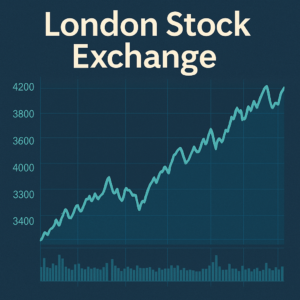Explore the latest trends on the London Stock Exchange (LSE). Learn about its key indices, market performance, and investment opportunities.
London Stock Exchange: Market Insights, Trends, and Investment Opportunities

Introduction
The London Stock Exchange (LSE) is one of the world’s oldest and most significant stock exchanges. It serves as a hub for international finance and trading, hosting thousands of companies from around the globe. Understanding the LSE’s performance is crucial for investors aiming to gain exposure to global markets.
What Is the London Stock Exchange?
The London Stock Exchange is located in London, UK, and is a primary global stock market. It offers trading in various financial instruments, including stocks, bonds, and derivatives.
Key Features of the LSE:
-
FTSE Indices: Home to major indices like the FTSE 100 and FTSE 250.
-
Global Reach: Includes companies from diverse industries and countries.
-
Highly Liquid Market: Facilitates large volumes of trades.
-
Market Capitalization: One of the largest in Europe.
Why Is the London Stock Exchange Important?
The LSE is vital for investors looking for global exposure, particularly in the European and UK markets. Its benchmark indices, like the FTSE 100, are often seen as indicators of the UK economy.
Reasons to Monitor the LSE:
-
Economic Health Indicator: Tracks the performance of top UK companies.
-
Global Investment Gateway: Connects investors to European and international markets.
-
Diverse Sectors: Includes finance, energy, consumer goods, and more.
-
Trading Volume: High liquidity makes it attractive for active traders.
Popular Indices on the LSE
-
FTSE 100: Tracks the top 100 companies by market cap listed on the LSE.
-
FTSE 250: Represents mid-cap companies, offering insights into domestic market performance.
-
FTSE All-Share: A broader index covering the majority of UK-listed companies.
-
AIM Index: Focuses on smaller, growth-oriented businesses.
Index Performance:
As of the latest update, the FTSE 100 is witnessing fluctuations due to factors like:
-
Economic Policies: Impact of interest rate changes by the Bank of England.
-
Global Factors: Brexit implications and geopolitical tensions.
-
Corporate Earnings: Quarterly results impacting key sectors.
How to Invest in the London Stock Exchange
Investors can access the LSE through:
-
ETFs and Index Funds: Such as the iShares FTSE 100 ETF.
-
Direct Stock Purchases: Buying shares of listed companies.
-
ADR Listings: For non-UK residents investing in LSE-listed stocks.
-
Mutual Funds: Managed funds that include LSE-listed companies.
Benefits of LSE Investments:
-
Diverse Exposure: Access to leading global companies.
-
Stability: Major indices like the FTSE 100 offer lower volatility.
-
Economic Insights: Reflects both UK-specific and global economic trends.
Current Trends and Market Updates
The LSE is currently experiencing:
-
Market Volatility: Driven by global economic uncertainties.
-
Sector Shifts: Increased focus on energy and technology companies.
-
Investor Sentiment: Mixed, with cautious optimism amid inflation concerns.
(Note: Update this section with the most recent market data.)
LSE vs. Other Major Exchanges
Compared to other global exchanges, the LSE:
-
Offers Diverse Listings: Unlike the Nasdaq, it includes various industries beyond tech.
-
Global Reach: Similar to the NYSE, but with a stronger focus on European markets.
-
Financial Hub: Like Wall Street, the LSE is a center for financial activity in Europe.
Key Differences:
-
Currency Impact: Prone to fluctuations due to changes in the British Pound.
-
Brexit Influence: Political changes uniquely affect the LSE compared to US exchanges.
-
Regulatory Environment: Different financial regulations compared to the US and Asia.
Investment Tips for the London Stock Exchange
-
Diversify: Include both large-cap and mid-cap companies.
-
Stay Updated: Monitor economic policies and UK-specific news.
-
Sector Analysis: Pay attention to financial, energy, and consumer goods sectors.
-
Global Events: Be mindful of how international developments impact the LSE.
Conclusion
Investing in the London Stock Exchange offers an opportunity to gain exposure to a diverse and historically significant financial market. Whether you’re interested in large blue-chip companies or emerging growth stocks, the LSE provides valuable insights into the economic landscape. Stay informed to make the most of your investment strategies.
What are your thoughts on the current state of the LSE? Share in the comments!